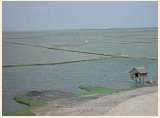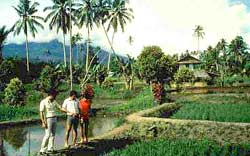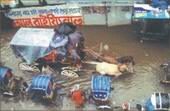 lready
Bangladesh is fighting a losing battle against rising salinity
levels. Faced with potentially disastrous effects on agriculture, the
country has come up with a strain of rice that grows in salty water.
lready
Bangladesh is fighting a losing battle against rising salinity
levels. Faced with potentially disastrous effects on agriculture, the
country has come up with a strain of rice that grows in salty water.Retreating Himalayan Icefields
Threatening Drought in Bangladesh
Farmers in Bangladesh who used to grow rice are now farming prawns, the water in their fields is so salty nothing will grow there.
Bangladesh is the front line of global warming:
rivers drying up
increasingly common freak weather conditions that include out-of-season tornadoes
tides that have stopped changing.
The entire country is one huge delta; the rivers are its lifeline. They are the main source of fresh water for a country where agriculture represents 21 per cent of the economy. If the Himalayan glaciers melt, the rivers' flow will reduce drastically. There is no defense against drought.
A lready
Bangladesh is fighting a losing battle against rising salinity
levels. Faced with potentially disastrous effects on agriculture, the
country has come up with a strain of rice that grows in salty water.
lready
Bangladesh is fighting a losing battle against rising salinity
levels. Faced with potentially disastrous effects on agriculture, the
country has come up with a strain of rice that grows in salty water.
Bangladesh has good reason to feel aggrieved at global warming. Its annual carbon emissions only 0.172 tons per capita, compared to 21 tons in the US.
 The
Independent
http://www.countercurrents.org/cc-huggler300307.htm
The
Independent
http://www.countercurrents.org/cc-huggler300307.htm
Bangladesh, is predicted to lose about 17% of its land to rising sea levels.
In Bangladesh, thousands of farmers have suffered from the invasion of their rice lands by aquaculture owners and by destruction or damage to their rice crops by seepage of salt water from the shrimp ponds. Shrimp owners have been buying up the rice farmers' infertile lands very cheaply, rendering them landless. One study estimated that 300,000 people were displaced from their farmlands by aquaculture in the Satkhira region alone. http://www.sos-arsenic.net/english/environment/shrimp.html www.oceansatlas.org/.../img/5.paddycoconuts.jpg

Climate
modelers forecast that as the world warms, the monsoon rains in the
region will concentrate into a shorter period, causing a cruel
combination of more extreme floods and longer periods of drought.
http://www.sos-arsenic.net/english/environment/env-refugee.html
A11_s3